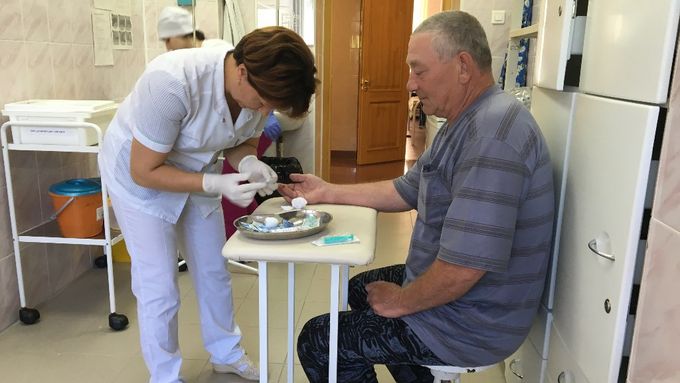Parasitic Worms in Siberia
13.09.2017
Millions of people worldwide are infected with parasitic worms, most of them in tropical low-income settings. But they can also affect populations in the far north east, as it is the case with Opisthorchis felineus which causes liver infections in Siberia. To find better treatment options against O. felineus, the Swiss Tropical and Public Health Institute works with partners in Siberia, Russian Federation.

200 patients have been enrolled in the clinical trial to improve treatment of opisthorchiasis.
More than half of the population in endemic regions of the Western Siberia is infected with Opisthorchis felineus - or cat liver fluke - according to epidemiological studies conducted by the Swiss Tropical and Public Health Institute (Swiss TPH) and the Siberian State Medical University (SSMU).
Infection occurs when people consume raw and undercooked fish containing O. felineus. Although many patients do not show symptoms, chronic infection of opisthorchiasis can eventually lead to an infection of the gall bladder, obstructive jaundice, an enlarged liver and/or malignant cancer of the bile ducts.
Facilitating treatment
The current treatment approach in Siberia is complex. Patients are hospitalised for up to two weeks and administered three doses of deworming medicine spread over 24 hours including in the middle of the night.
Swiss TPH and SSMU now launched a clinical trial to find a more adequate treatment approach. "The idea is to ultimately be able to treat opisthorchiasis directly in the out-patient departments without the need for hospitalization," explains Olga Fedorova, SSMU. "This way, we would be able to reach many more infected people."
The clinical trial will test three different doses of Praziquantel, the standard treatment against parasitic worms, as well as one placebo group. In addition, pharmacokinetic parameters will be studied. First results are expected early next year.
Learnings from south to north and vice-versa
It is the first time that Praziquantel is tested in the global north. "This is a very different setting from what we are used to in sub-Saharan Africa or Southeast Asia," says Jennifer Keiser, Swiss TPH. "Nonetheless, our experience acquired in tropical countries is very valuable for this project and at the same time, we can acquire new expertise thanks to our partners in Siberia."
Leading institution in helminth drug development
Swiss TPH is one of the leading institutions worldwide in discovering novel treatments and conducting clinical trials in the area of parasitic worms. Swiss TPH is also part of the Tomsk Opisthorchiasis Consortium (TOPIC), which brings together science and industry to drive translational research and development in liver fluke diseases.
On 7 and 8 December 2017, Swiss TPH hosts an international symposium on the topic of "Helminth Infection - from Transmission to Control" in Basel, Switzerland.
Stay connected
Subscribe to our newsletter and get all the latest research news, project updates, course and event listings from Swiss TPH.